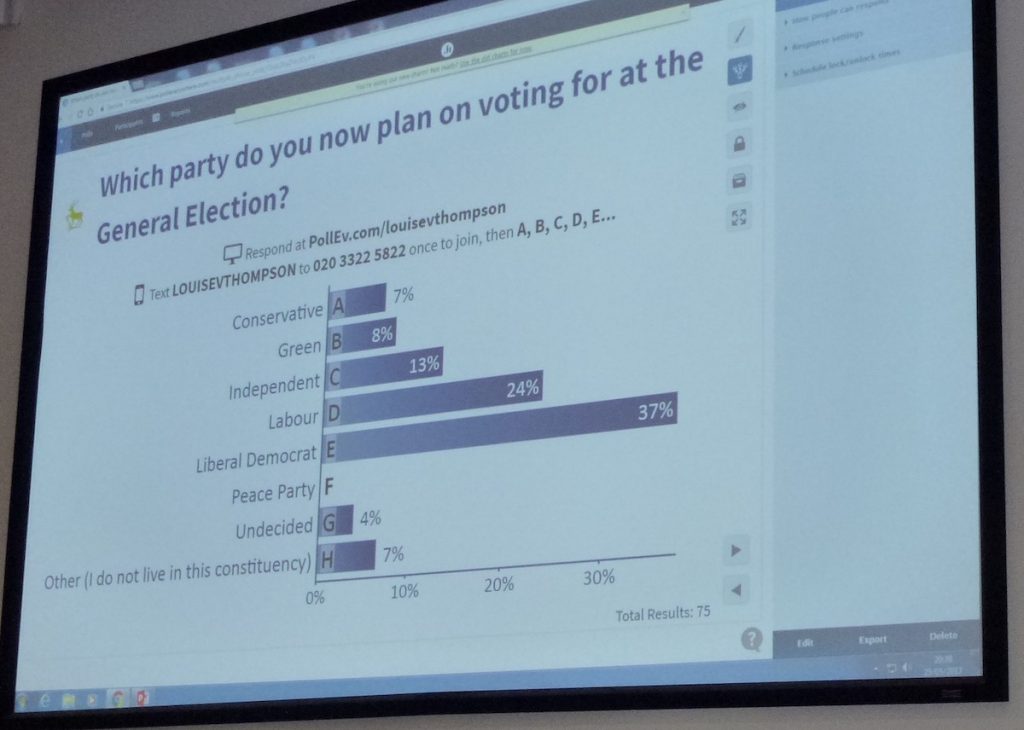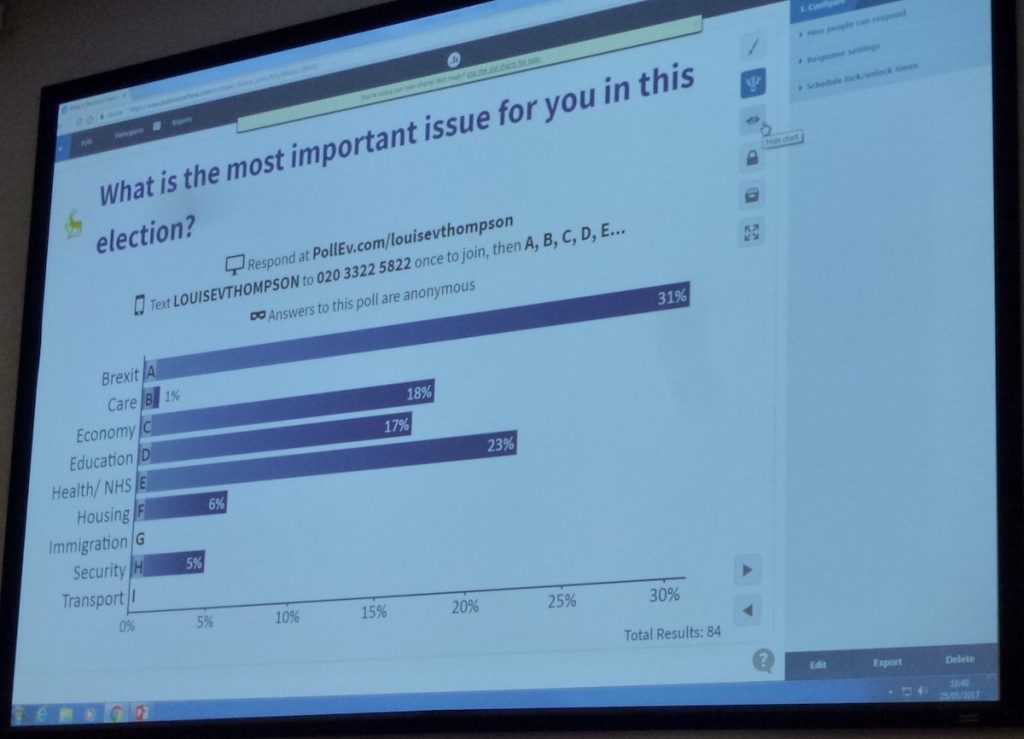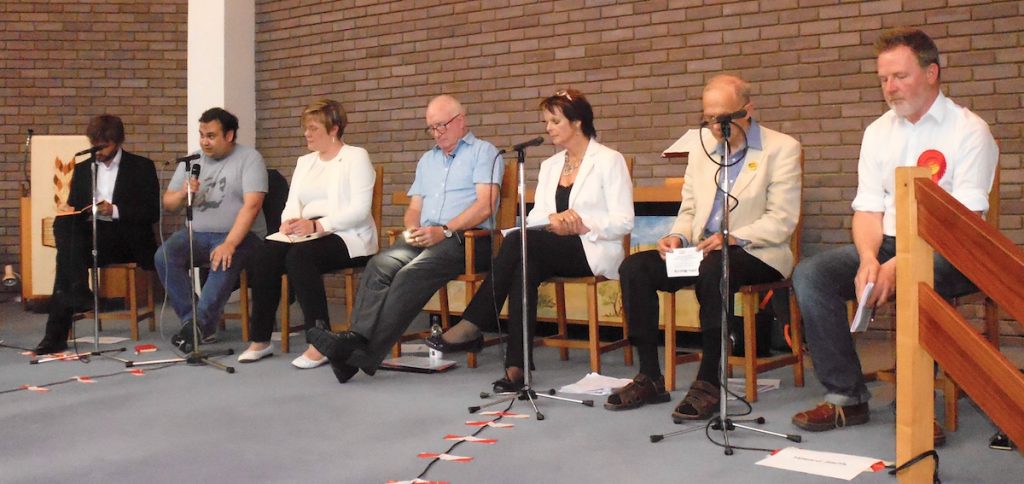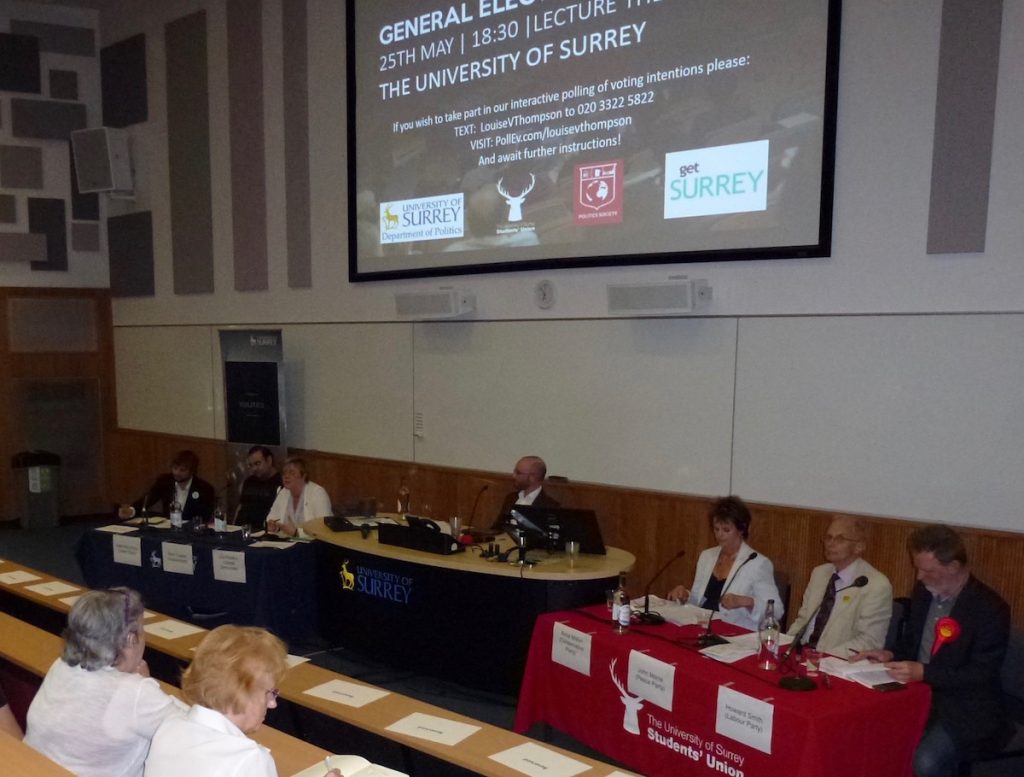 Abraham Lincoln
If given the truth, the people can be depended upon to meet any national crisis...
Abraham Lincoln
If given the truth, the people can be depended upon to meet any national crisis...
 Guildford news...
for Guildford people, brought to you by Guildford reporters - Guildford's own news service
Guildford news...
for Guildford people, brought to you by Guildford reporters - Guildford's own news service
Opinion: Can These Guildford Hustings Be Believed?
Published on: 30 May, 2017
Updated on: 1 Jun, 2017

The results of the audience poll conducted at the end of the event at the University of Surrey hustings which, compared to a similar poll taken at the beginning of the meeting, showed a substantial and slightly increased lead for the Liberal Democrats, a reduction in the Tory share from 12% to 7% and a surprising leap in support to from 0% to 15% for the independent, Semi Essessi.
By Martin Giles
Liberal Democrat Zoe Franklin will be Guildford’s next MP, at least she will if last week’s hustings audiences are anything to go by. But is that really likely?
Do you remember Gary Linekar’s description of football? He said: “Football is a simple game, played for 120 minutes – and then the Germans win on penalties.”
Guildford politics is equally simple: lots of hot air and then the Conservatives win at the ballot box. (Yes, I know the Lib Dems won in 2001 but the Germans have lost football matches a few times too – just exceptions that prove the rule.)
Even as we are told to “mind the (narrowing) gap” in the opinion polls it seems unthinkable that Anne Milton could be defeated. Unthinkable even taking into account the very real and significant disquiet over Brexit that will make some, normally Tory supporting, voters look elsewhere in addition to those who won’t vote Tory because they feel that the pressure caused by central government policy is behind plans to develop some of our green belt.
 The Lib Dems should hoover up Remainers’ votes, but when the pencils hover over the ballot papers how many of them will have second thoughts and stick with the Tory devil they know?
The Lib Dems should hoover up Remainers’ votes, but when the pencils hover over the ballot papers how many of them will have second thoughts and stick with the Tory devil they know?
More of us are said to be floating voters than ever before these days and the Lib Dems are reporting that their canvassing is showing the switch could be sizeable. But we all hear what we want to hear and it would take an enormous swing to overturn Milton’s 22,000 majority.
Last week’s two hustings events were a contrast. I came away quite depressed from the first at the University of Surrey (May 25, 2017). It seemed same old, same old. The audience did not appear to be representative and the quick-fire Q & A format gave the candidates no time to develop their answers which were largely predictable.
I did not feel I had learnt much with one standout exception. Semi Essessi standing as an independent was not some single issue eccentric, desperate for a bit of limelight. He was refreshingly straightforward, offered intelligent insights and some new ideas. Of course, he did not have to remain “on message”. As he said, “I am the leader, the party and its supporter!”
He was free to say exactly what he liked. And what he said revealed a thoughtful, informed mind.
Questioned by me after the meeting about the reason he had opted not to allow his address to be published on the official nomination form he explained that he house-shared and did not think it was fair on his house-mates.
There is no doubt about his sincerity. Disillusioned with the political party process but with a strong feeling he had something to say, he sold his car to raise the £500 candidate’s deposit and stood. Even one of his competing candidates admitted he was a breath of fresh air.
Mark Brett-Parry the Green candidate also knew his stuff but was probably disappointed that environmental issues were hardly raised, something the Green Party are now, understandably, complaining about nationally. He did say that his party was against green belt development but was clearly comfortable with his party’s left-wing positioning which is unlikely to attract those with green leanings.

The list of most important issues was not borne out by the questions which concentrated on the housing issue, perhaps unsurprisingly, given the situation here in Guildford.
Labour’s Howard Smith is also further left than his predecessor, Richard Wilson, the airline pilot who cut up his party membership card when Jeremy Corbyn was elected leader. Smith was keen to stress his Guildford born and bred credentials. He accepts the need to develop some of our borough’s 89% green belt to address the “housing crisis” and sees those objecting as Nimbys. He is also, unlike his party, against Trident renewal.
He was able to avoid Anne Milton’s question on the problem of an opposition party leader being unpopular with his own parliamentary colleagues, and the impact on the effectiveness of the opposition when Labour supporters in the audience vociferously claimed foul. It seemed a fair enough question to me. It is a real problem and I would have liked to have heard Smith’s answer.
Zoe Franklin is the only candidate with any possible chance of defeating Milton. But how many Lib Dems would put their house on a Lib Dem victory? The bookies are still quoting 500 or 200/1 on for Milton and 30 or 40 to one against for the Lib Dems.
Nonetheless, Franklin spoke well and her passion shone through. To some, the biggest sectors of the two audiences it seemed, the promise of a second referendum on the EU is definitely a straw worth clutching in their desperation over Brexit. But Franklin spoke effectively too on the problems faced by the less affluent sections of Guildford. Her experience as a borough councillor for Stoke has given her real and valuable experience.
It is hard not to like John Morris from the Peace Party. He is artless in his belief that all evil can be overcome with a bit more love and understanding. He sounds a bit like Corbyn in that respect. At one point I wondered if he was going to ask us all to join hands and sing John Lennon’s Imagine. There is no doubting his sincerity, but sadly I am not sure what it achieves.
Surprisingly, given the electoral dominance of the Conservatives locally, I felt some sympathy for Anne Milton, the sympathy one has for an underdog. Understandably perhaps, in a normally true blue town, she faced not only the anger of the convinced Remainers and the expected antipathy of the Labour and Green supporters but also the complacency, or apathy, of Conservative supporters who, perhaps because of their own disquiet over Brexit did not show up or, if they were present, kept a low profile.
Perhaps they felt intimidated. It takes guts to say something you know is going to be unpopular, or perhaps they sat back feeling a little discomfort was due. The normal civility of a Surrey audience meant that matters did not get out of hand, at either hustings meeting, but there were flashes of passion and Milton was the target.

The candidates panel chaired by Rod Boreham (centre, blue shirt) at the hustings held at Guildford United Reformed Church.
I preferred the format of the hustings at event Guildford United Reformed Church in Portsmouth Road on Friday evening (May 26). The chairman had selected the questions so that the main topics of the day were covered. Brexit and housing of course, but also Anne Milton’s voting record and the party political whipping process.
She stuck to the line, in both meetings, that every MP was free to vote as their conscience dictated and of course that is true, in the same way that a swallow is free to stay in England in September. The question remains: why have a whip’s office and a whipping system if parties do not wish to instil discipline and persuade their MPs to follow the party line? And it’s not just the Tories, of course.
The normal defence of the whipping system is that it helps ensure parties deliver on their commitments but for whatever reason Milton did not use that argument. Strange.
I cannot replay everything covered at these meetings, of course, but here is a synopsis of what was said at the Guildford United Reformed Church meeting on three of the hottest election topics: housing, social care funding and Brexit.
Housing
When it came to a question on Guildford’s house prices unreachable for many, Mark Brett-Parry (Greens) put some of the blame on those buying property purely as an investment. The Green Party would fund the building of smaller houses and suggested new legislation to protect renters.
Howard Smith (Labour) thought the problem solvable. He said a Labour government would arrange for the construction of more social housing and restrictions on buy-to-let. The release of some of Guildford’s 89% green belt, for small affordable houses, was also necessary.
Semi Essessi (independent) thought there was too much focus on the supply side of the problem and a failure to address the underlying problems causing the current unmet demand. He echoed Brett-Parry’s comments on the problems caused by those with deep pockets who saw houses as simply investment opportunities.
Zoe Franklin relayed the Lib Dem’s manifesto commitments to help buyers raise necessary deposits and introduce a rent-to-buy scheme. Avoiding specific mention of the green belt, she said houses should be built where they are needed and that the Lib Dems would lift the cap on housing association borrowing and heavily tax empty homes.
Anne Milton (Conservative) admitted that the current housing market is not working. The Conservatives were proposing spending £7.1 billion for non-profit affordable homes programme and making money available for smaller developers. She said she had always been a supporter of the green belt and gave the example of acres of land used for car parking at the University of Surrey implying that brownfield development had not yet been properly exhausted. She also believed that the pressure to develop should be spread to other areas than the South East.
John Morris (Peace) believed that the better application of the human values of caring, compassion and hope should be applied to the problem. He thought that the necessary building should be done as soon as possible. He thought the only way to make homes affordable was to have enough of them and thought funding the necessary work was the government’s problem.
Social Care Funding
Zoe Franklin said the Liberal Democrats were proposing to put £6 billion into social care partly funded by a 1p increase in income tax and ring-fencing the NHS/social care budgets. Healthcare and social care should be properly joined up under a cross-party review.
Anne Milton (Conservative) said it should be borne in mind that demand for healthcare was infinite as better drugs and treatments became available and we are living longer. With her background in nursing, she said she found it enormously frustrating that healthcare and social care were still not properly linked, a problem that had been recognised at least 40 years ago. The Conservatives wanted to fix the anomaly by which families had different liabilities for the costs of treatment and care depending on the disease.
Howard Smith (Labour) believed that, in line with the Labour manifesto, social care should not be considered different than healthcare. It should be provided free and paid for through extra taxation, increases in corporation tax and income tax for the top earners. It is unfair to use family homes to fund such care, he said.
John Morris (Peace) believed that the human values of respect, humanity and responsibility should be applied to the situation. Once again the government should be responsible for providing the necessary funding.
Semi Essessi (independent) said we should be mindful of the overall economic situation the country was in we have a £1.7 trillion national debt and a deficit which means it continues to grow. Fiscal policy needed to be applied carefully and tax cuts and rises could have unexpected consequences. Printing money was unlikely to be a solution and was part of the reason we were in our current position. But as one of the wealthiest countries in the world, we should be able to look after our old people. Perhaps pensions should be handed to the private sector who seemed to be able to provide them and produce a profit.
Mark Brett-Parry (Greens) said that healthcare and welfare should be free, the necessary funding provided through taxation including extra taxation on unhealthy products such as tobacco and alcohol and claimed that proposals in his party’s manifesto had been fully costed, unlike those of the Conservative and Labour parties according to the IFS (Institute for Fiscal Studies).
Brexit
The question was who would each candidate represent constituency interests during the Brexit process.
Zoe Franklin kicked off by saying that the Liberal Democrat position was very clear, they still felt that the best place for the UK was as part of Europe and that the electorate should be trusted with a further referendum on the proposed deal eventually struck with the EU with the option of remaining and EU member being the alternative choice. She felt that this would best serve local business interests particularly the lucrative IT gaming industry that is already finding it difficult to recruit, and the NHS. The Liberal Democrat presence in parliament was also the best insurance against a hard Brexit.
John Morris (Peace) was fully in favour of the UK being a member of the EU, but no felt he had to accept what had happened, whatever was thought of the referendum arrangements. If the opportunity arose for a second referendum he would campaign, once again, to remain. Patience, trust and humility were the human values that should be applied to this subject. He advised the audience to keep abreast of the debate by reading The Guildford Dragon NEWS and hoped that a good relationship with the EU could be maintained.
Howard Smith (Labour) recalled that he together with other Labour Party members had campaigned hard with colleagues from other political parties to Remain and he had been devastated by the result last June. His only solace was that Guildford had voted remain. But the Labour Party was democratic so had to accept the result. They were neither in favour of the “no deal is an okay deal” train of thought nor did they think all measures were permissible to block Brexit. His party’s efforts would concentrate on getting the best possible deal but that if it was not a good deal they would reject it.
Semi Essessi (independent) admitting that he had voted to leave quoted the EU’s chief Brexit negotiator, Guy Verhofstadt, who, Essessi said, had stated something like: “You [the UK] will suffer at the end of this deal because what is the point of the EU if it is not a benefit to be a member of IT?” “I believe in democracy, real democracy,” said Essessi, adding “…not as just a word bandied about by politicians and that it was not about the tyranny of the masses It is about representing everyone.” So if he was elected he would stay mindful that most of the Guildford electorate have voted remain and he would be keen to support giving EU citizens the right to remain in the UK and preserve environmental and worker protections.
Mark Brett-Parry (Green Party) said his party agreed with the Lib Dems that a second referendum was necessary and the deal produced by the government. He claimed that the EU had offered reciprocal arrangements over the rights of EU/British Citizens remaining here or in EU countries respectively but that it had been rejected.
Anne Milton was asked if she had been able to adequately represent Guildford on the subject, given her position as the government’s deputy chief whip. She said that she had not felt at all constrained by her position but did enjoy exceptional access to ministers which gave a better opportunity to represent some of the constituency’s issues than other MPs. She had voted to remain but had been genuinely conflicted partly because of frustration experienced during her time as a health minister when the EU had stymied desired changes to proposed changes to alcohol taxation. Now she believed a second referendum and the uncertatinty it would represent would be very damaging to the business sector who desired certainty above all else.
Responses to Opinion: Can These Guildford Hustings Be Believed?
Leave a Comment Cancel replyPlease see our comments policy. All comments are moderated and may take time to appear.
Recent Articles
- Guildford Institute’s Crowdfunding Project for Accessible Toilet in its New Community and Wellbeing Centre
- Letter: Guildford – Another Opportunity Missed?
- Letter: GBC’s Corporate Strategy – Where Is the Ambition?
- My Memories of John Mayall at a Ground-breaking Gig in Guildford Nearly Six Decades Ago
- Westborough HMO Plans ‘Losing the Heart of the Street’ Says Resident
- College Invests to Boost Surrey’s Economy and Close Digital Skills Gap
- Community Lottery Brings Big Wins for Local Charities
- GBC Housing Plan Promises ‘A Vibrant Urban Neighbourhood’ Near Town Centre
- Hospital Pillows ‘Shortage’ at the Royal Surrey
- Updated: Caravans Set Up Camp at Ash Manor School


Recent Comments
- Ian Macpherson on Updated: Main Guildford to Godalming Road Closed Until August 1
- Sara Tokunaga on GBC Housing Plan Promises ‘A Vibrant Urban Neighbourhood’ Near Town Centre
- Michael Courtnage on Daily Mail Online Reports Guildford Has Highest-paid Council Officer
- Alan Judge on GBC Housing Plan Promises ‘A Vibrant Urban Neighbourhood’ Near Town Centre
- John Perkins on GBC Housing Plan Promises ‘A Vibrant Urban Neighbourhood’ Near Town Centre
- S Collins on GBC Housing Plan Promises ‘A Vibrant Urban Neighbourhood’ Near Town Centre
Search in Site
Media Gallery
Dragon Interview: Local Artist Leaves Her Mark At One of England’s Most Historic Buildings
January 21, 2023 / No Comment / Read MoreDragon Interview: Lib Dem Planning Chair: ‘Current Policy Doesn’t Work for Local People’
January 19, 2023 / No Comment / Read MoreA3 Tunnel in Guildford ‘Necessary’ for New Homes, Says Guildford’s MP
January 10, 2023 / No Comment / Read More‘Madness’ for London Road Scheme to Go Ahead Against ‘Huge Opposition’, Says SCC Leader
January 6, 2023 / No Comment / Read MoreCouncillor’s Son Starts Campaign for More Consultation on North Street Plan
December 30, 2022 / No Comment / Read MoreCounty Council Climbs Down Over London Road Works – Further ‘Engagement’ Period Announced
December 14, 2022 / No Comment / Read MoreDragon Interview: GBC Reaction to the Government’s Expected Decision to Relax Housing Targets
December 7, 2022 / No Comment / Read MoreHow Can Our Town Centre Businesses Recover? Watch the Shop Front Debate
May 18, 2020 / No Comment / Read More
















Stuart Barnes
May 31, 2017 at 3:31 pm
It sounds as though the audience could have been a typical BBC question type audience with the remoaners and the far left Corbynistas taking over. Even the left wing Dimbleby has started to apologise on the makeup.
Normal voters are not prepared to go to such totally predictable and rather unpleasant affairs.
The sooner Mrs May gets her increased majority so that she can deal with the House of Commons and Houses of Lords remoaners and gets us out of the failed EU the better, so that, amongst other things, we can have a rest from such politics.
As a final comment, I would suggest that despite all the huffing and puffing Anne Milton will sail home very comfortably.
John Robson
June 2, 2017 at 4:03 pm
Where is the evidence that Theresa May has the ability to negotiate with the EU?
She’s been one of the most inept home secretaries in living memory and has performed more U-turns than a dodgy plumber.
With the help of the Tory media, she appears to have reinvented herself as a modern day Boudica in the space of 2 months.
This so-called “strong” Leader refuses to engage in any kind of meaningful policy debate whether on TV or wherever with the so-called “weaker” opposition leaders. So how will she front up to the 27 EU attack dogs?
The one-dimensional Mrs Angry, “strong and stable” act is laughable and looking a tad transparent, hopefully, the narrowing polls suggest that people are starting to see through the nasty party and its scripted, empty rhetoric.